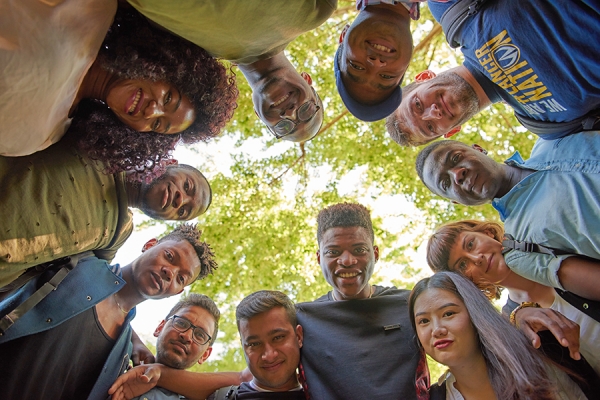 The Leading Change project amplifies the voices of young advocates fighting for gender equality across 11 countries in Africa and Asia.
The Leading Change project amplifies the voices of young advocates fighting for gender equality across 11 countries in Africa and Asia.
Joan Kembabazi, a young woman in Uganda, began advocating for gender transformative education in her community after the tragic loss of her best friend, who died in childbirth at age 13 following an arranged marriage.
“She was the person I always shared my dreams with. We dreamt about transforming our lives and community. I dreamed of becoming an environmentalist, and she dreamed of becoming a doctor to help women and girls in our community,” she shared in a digital story.
Kembabazi’s story is one created through Leading Change, an international research project led by Catherine Vanner, an assistant professor in the Faculty of Education. The initiative amplifies the voices of young advocates fighting for gender equality across 11 countries in Africa and Asia.
“The project was about studying their experiences with youth activism, both within their countries and on a global stage,” Dr. Vanner explained.
Driven by her friend’s memory, Kembabazi said she began by going door to door, teaching families about the importance of educating girls. She reached out to girls in her community, informing them of their rights and creating spaces for those who had no one to talk to.
“Gender-transformative education requires everyone in the community and school to take responsibility for breaking barriers,” Kembabazi said.
The concept involves the realization of safety and equity for students and teachers of all genders, as well as engaging students in critical reflection and action to build more gender equitable societies.
Eventually, she established the Gufasha Girls Foundation, named in honour of her friend, which offers skills training and resources to uplift young women.
“I wanted to see other girls empowered. If she had been empowered, (my friend) would never have accepted this marriage, and she would still be here,” Kembabazi said.
Vanner’s project brings together young activists like Kembabazi through a partnership with Transform Education, a global youth-led network advancing gender equality in education.
Transform Education is housed within the United Nations Girls’ Education Initiative and tackles key issues like gender-based violence, period poverty, and challenging gender norms in education.
“Recruitment for participants was sent out to members of the Transform Education network. We had these really beautiful virtual focus groups that brought together young people from all over to create digital stories that capture their experiences and messages. They were able to share these very different perspectives but also identify commonalities across those diverse contexts,” Vanner said.
“They are the most impressive people I’ve ever met. They are all powerfully advocating, some in very intense political contexts, for gender-transformative education.”
Leading Change highlights the participants’ personal stories and reflections through digital storytelling, two of which are now posted on the Transform Education website.
“What they told me is they want their stories to be heard,” Vanner said of the project’s goals. “After the digital story we created with Joan, she talked about feeling that she had made her friend proud. This is another platform where her friend’s story will be known, which will lead to more energy, interest, and motivation to do something differently.”
Youth activist participants will present their digital stories and share the results of the Leading Change research in a webinar scheduled for Friday, Jan. 31, from 9 to 10:30 a.m. Those interested in attending are invited to sign up here, with a formal invitation to follow.





